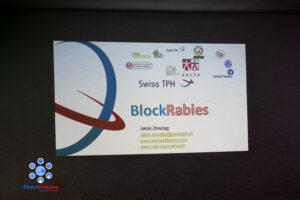28 September 2023
On September 5, 2023, at the headquarters of the Projet d’Amélioration de la Santé Animale et de l’Hygiène Publique Vétérinaire (PASA-HPV) in Côte d’Ivoire, the digital application for the BlockRabies project was launched. This innovation aims to revolutionize rabies data collection, communication and information sharing between different sectors, and vaccine stock traceability through the use of blockchain technology. This breakthrough promises to improve care, reduce costs and delays in patient treatment, and save lives by ensuring rapid access to vaccines.
Professor Jakob Zinsstag, principal investigator of the BlockRabies project, emphasized that this application is the first in the world to register both exposed patients and biting animals, while guaranteeing the security of the vaccine supply chain. The application will enable real-time monitoring of vaccine stocks, distribution, use and early warning of cases, diagnostic results and rapid access to vaccines.

Prof. Jakob Zinsstag, PI of BlockRabies Project
In Côte d’Ivoire, around 40% of patients abandon preventive treatment after being exposed to dog bites and scratches. Officially, around twenty people die of rabies every year, not to mention under-reported cases in communities. What’s more, it often takes two weeks or over a month to obtain the results of a rabies test on a biting dog, and only 10% of these dogs turn out to be carriers of the virus. Prof. Jakob Zinsstag pointed out that this application enables instant communication, helping doctors to quickly determine whether the biting animal was indeed carrying the virus, which will save doses of vaccine that need to be used.
The BlockRabies project is the fruit of the commitment of researchers from the Afrique One consortium, in particular Prof. Bassirou Bonfoh, Prof. Jakob Zinsstag, Dr Kathrin Heitz-Tokpa, Dr Vessaly Kallo and Ms Rose Delima N’Guessan, together with their colleagues in Mali. On the basis of the results of the 2016-2020 research, they developed the political process for combating the disease and the basis for improving intersectoral communication, facilitated by blockchain technology.
Prof. Bassirou Bonfoh, Director of the Afrique One consortium, emphasised that rabies remains a public health problem requiring intersectoral collaboration and collective, coordinated action to eliminate it. The blockrabies application is a concrete example of how science, technology and international and community collaboration can combine to solve urgent public health problems.

Prof. Bassirou Bonfoh, Director of Afrique One
The BlockRabies application has been tested with the active participation of representatives of the veterinary services, public health experts and vaccine specialists, and representatives of the inter-sectoral rabies committees in San Pedro and Bouaké. These tests have identified operational aspects requiring adjustment, and a dedicated team will be working to propose practical solutions to resolve them, including the user manual and the procedure manual.
The Swiss companies Codebar Solutions SARL and dHealth, renowned for their expertise in software development and blockchain technology, are behind the development of the BlockRabies application.
Although the application is currently in the testing phase, major efforts are being made to make it functional and better adapted to the needs of rabies control in Africa and around the world.
The launch of the BlockRabies application marks a significant milestone in the fight against rabies in Africa. The next steps include the deployment of the application in specific regions of Africa where rabies is particularly prevalent, as well as an awareness campaign to inform decision-makers about the public health potential of this application.
The Blockrabies project is funded by the EDCTP/European Union, with scientific and technical support from the Afrique One consortium.  The project partners are Institut Pasteur de France, Université des Sciences, des Techniques et des Technologies de Bamako (USTTB), Laboratoire Central Vétérinaire (LCV), Centre Suisse de Recherches Scientifiques en Côte d’Ivoire (CSRS), Institut National d’Hygiène Publique (INHP), Ministère des Ressources Animales et Halieutiques (MIRAH), Fondation de Traçabilité des Informations Sanitaires (HIT), Institut Tropical de Santé Publique Suisse (Swiss TPH).
The project partners are Institut Pasteur de France, Université des Sciences, des Techniques et des Technologies de Bamako (USTTB), Laboratoire Central Vétérinaire (LCV), Centre Suisse de Recherches Scientifiques en Côte d’Ivoire (CSRS), Institut National d’Hygiène Publique (INHP), Ministère des Ressources Animales et Halieutiques (MIRAH), Fondation de Traçabilité des Informations Sanitaires (HIT), Institut Tropical de Santé Publique Suisse (Swiss TPH).
Share on: